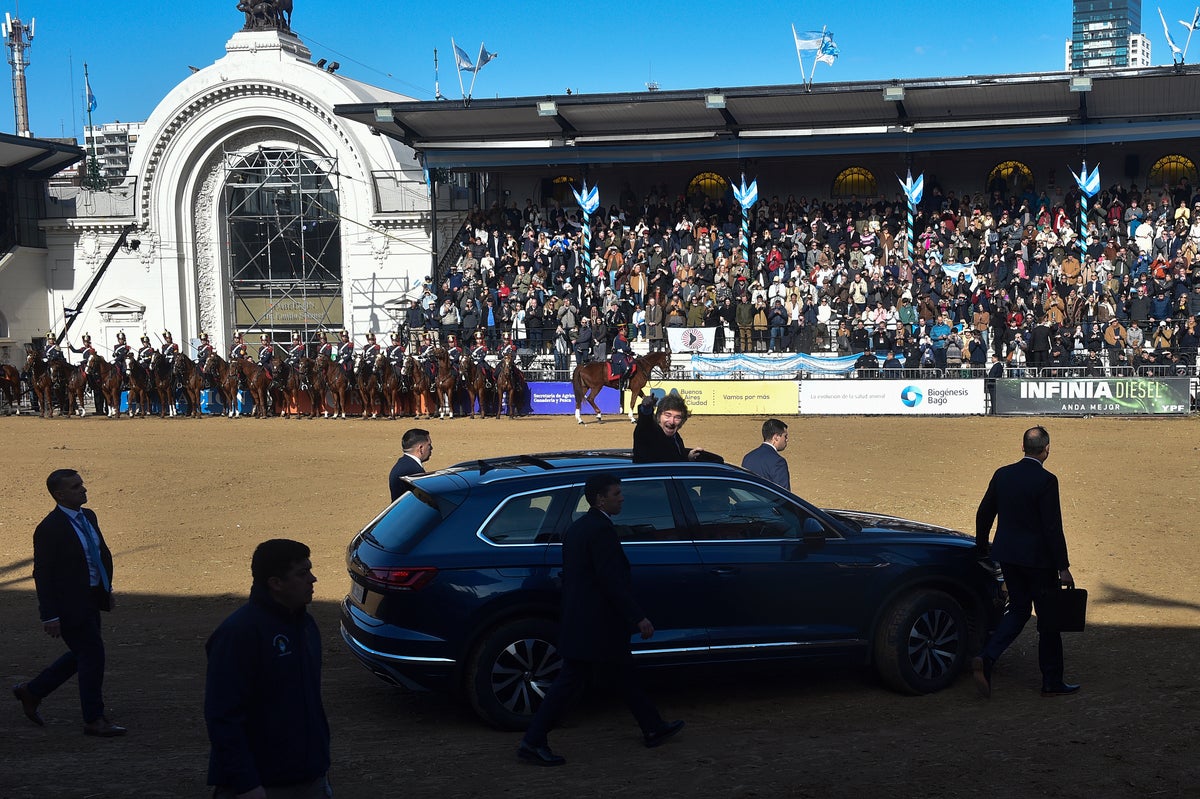
Support truly
independent journalism
Addressing crowds of struggling farmers in flat caps and home-knit sweaters who helped vault him to power but have grown increasingly impatient with his progress, President Javier Milei on Sunday vowed to scrap export taxes and rescue Argentina's key agricultural industry.
The country’s powerful agricultural producers say they're willing to give the libertarian more time to deliver on his free-market promises. But many farmers are disillusioned that seven months into Milei's presidency, they remain hobbled by labyrinth currency controls, crushing export taxes and an uncompetitive exchange rate.
“We said we were going to lift the restrictions and every day we do," Milei said at Argentina's annual La Rural convention, where for one week the huge Buenos Aires exposition ground becomes one vast farmyard teeming with sleepy cows and whinnying horses. “No one is as eager as we, and me in particular, are to get out of this disastrous model where the state, through withholdings and restrictions, expropriates 70% of what the countryside produces."
The crowds whooped and cheered. As the farmers tell it, that model of budget-busting populism confiscated their wealth for redistribution among the unproductive masses and devastated the lush grain belt that made Argentina among the world’s richest economies a century ago.
Today, Argentina remains one of the biggest livestock and grain producers but its more dubious distinctions include being beset with one of the world’s highest debt burdens and highest annual inflation rates.
Successive left-leaning Peronist administrations in recent decades took an estimated $200 billion from the agricultural sector into state coffers, banning meat exports to stem inflation and levying sky-high export taxes on agricultural commodities to pay for bloated budgets.
So far under Milei, Argentina's agricultural industry — which accounts for some 20% of the country's gross domestic product — is “hopeful but realistic," said Nicolás Pino, head of the Argentine Rural Society, the country’s agribusiness lobby.
“There are sufficient reasons to complain, but we prefer at this time to appeal to the patience of the men and women of the countryside,” Pino said. “We believe it's useful to give the government some space for trust."
But already there are signs that patience in Argentina's fertile Pampas is wearing thin.
Earlier this week, the Argentine Rural Confederation, one of the country’s main producers’ groups, turned up the pressure on Milei with a harsh statement lamenting the government’s failure to eliminate the “unfair, arbitrary and distortive tax” on agricultural exports” that it said, “suffocates our producers.”
President Milei has prioritized balancing the government’s books and quelling inflation — key campaign promises that he hopes can keep public opinion from swinging against him as his austerity drive hits Argentines hard.
But agricultural leaders say these goals have come at the cost of other campaign pledges to unleash the free market and end heavy-handed state intervention.
“We need clarification about some of these recent economic measures,” said Elbio Laucirica, the head of another agribusiness group.
In recent weeks, Milei has moved to hike up taxes and tighten his grip on the exchange rate, contradicting his libertarian orthodoxy and stoking frustration among farmers.
Because Milei's plans to prop up the peso have reduced export competitiveness, Argentine farmers whose sales are linked to the U.S. dollar are hanging on to their harvests, stockpiling billions of dollars worth of exportable grain and soybeans so they don’t have to surrender their dollars for less than what they are worth.
At the rural expo on Sunday, the grumbling was audible among the gauchos, or Argentine cowboys.
“Every decision like this affects us so much, and an overvalued exchange rate is not what we need from a government that promised us something different," said Maurro Berrra, a 34-year-old farmer wearing a trademark poncho and bombachas (trousers) who had hoped Milei's policies would prompt a gush of exports to his Chinese buyers. “We have more stability than last year, that is something, but we're still facing huge obstacles.”
A drop in local demand has also hurt Argentine producers. With poor and middle-class Argentines staggering under the government's extreme austerity measures and 270% annual inflation, beef consumption has dropped to its lowest recorded level in history, according to the Rosario Board of Trade.
“The economy has never been good to us, but this drop in consumption has really hit us hard,” said 67-year-old rancher Jorge De Marcos. “It's tragic because steak here isn't just steak, it's a way of life.”







